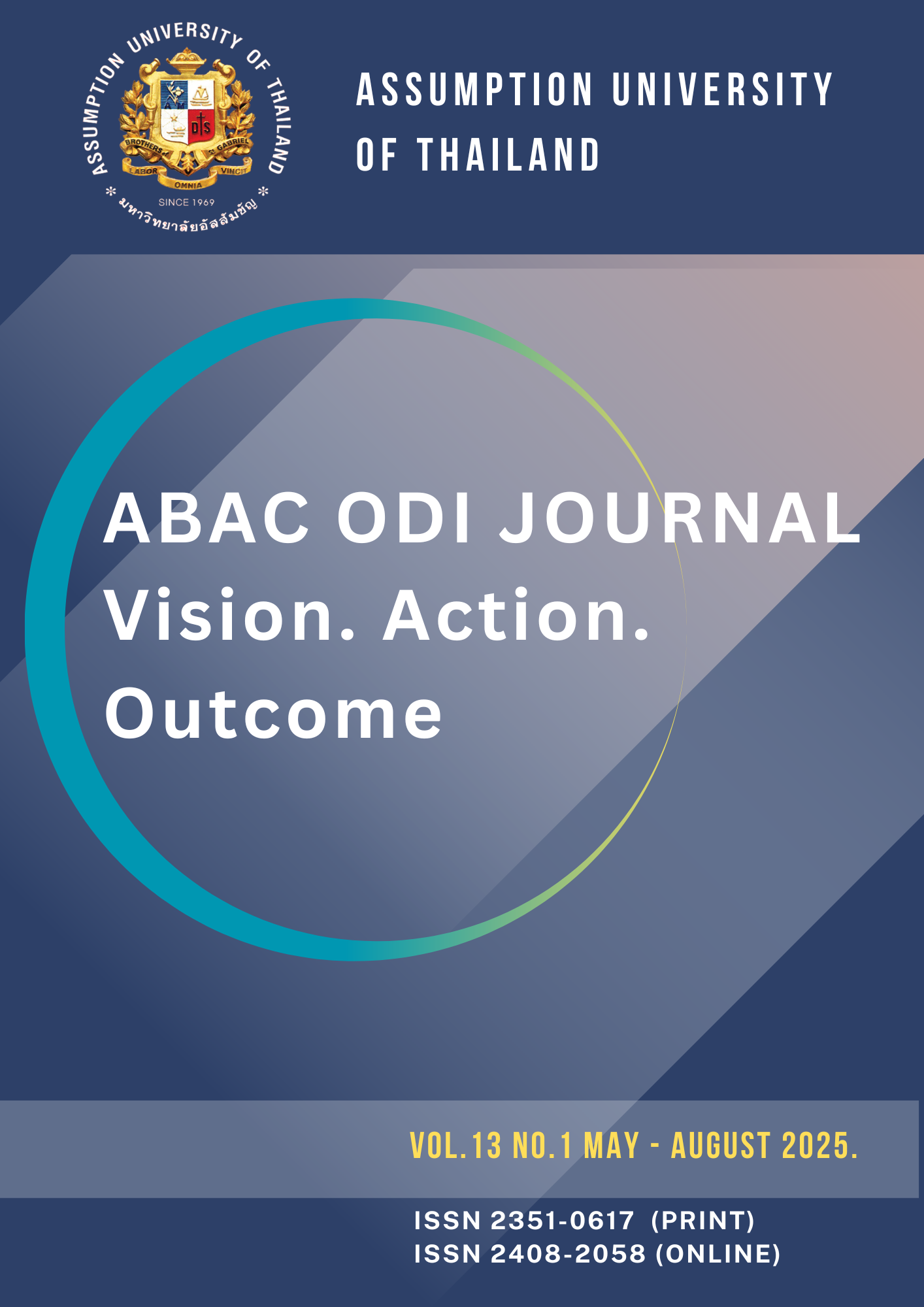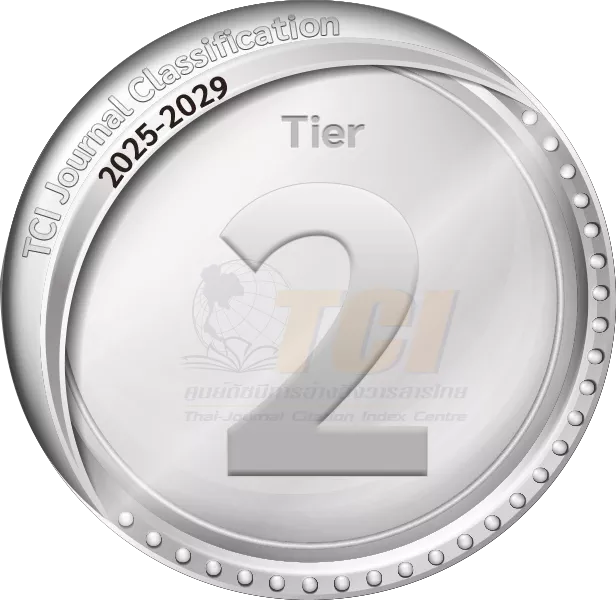Improve the Leadership Effectiveness of Middle Managers through Organizational Development Intervention in an International University in Heilongjiang Province
DOI:
https://doi.org/10.14456/abacodijournal.2025.24Keywords:
Moral Modeling, Vision Motivation, Leadership Charm, Individual Consideration, Leadership EffectivenessAbstract
The purpose of this study was to clarify the Pre-ODI and Post-ODI situations regarding Moral Modeling, Vision Motivation, Leadership Charm, Individualized Consideration, and Leadership Effectiveness in the Department of Economic Management. To design practical ODIs to improve these variables and subsequently enhance leadership effectiveness. To identify significant differences in these variables between Pre-ODI and Post-ODI and to measure the causal relationships among them. Both qualitative and quantitative research methods were used to compare and analyze the situations Pre-ODI and Post-ODI. Data were collected through questionnaires and focus group. This study selected 99 teachers from the Department of Economics and Management and 3 vice presidents of HIU as research samples. Quantitative data were analyzed using frequency, percentage, paired sample T-tests, and multiple linear regression analysis. Qualitative data were analyzed using content analysis. The quantitative analysis revealed significant changes in the mean values of each variable Pre-ODI and Post-ODI, demonstrating the effectiveness of the intervention. There were significant differences in Moral Modeling, Vision Motivation, Leadership Charm, Individualized Consideration, and Leadership Effectiveness between Pre-ODI and Post-ODI periods. It can be concluded that each independent variable has a significant influence on the dependent variable. A causal relationship exists among them. Through qualitative data analysis, this study identifies strategies for improving the transformational leadership of middle managers.
References
Bass, B. M. (1995). Leadership and Performance Beyond Expectations. Free Press.
Bass, B. M. (1995). Theory of transformational leadership redux. Leadership Quarterly.
Bing, X., & Guanfeng, S. (2014). Research on the influence mechanism of transformational leadership on team creativity: the intermediary role of team reflection and team boundary management. Science and Technology Management Research.
Bradbury, H. (2015). The Sage Handbook of Action Research. Sage.
Burns, J. M. (2003). Transforming leadership: A new pursuit of happiness.
Canhao, W., & Yufeng, D. (2018). Dual innovation of different leadership styles, knowledge accumulation and organization: the regulatory role of capacity flexibility . Scientific and technological progress and countermeasures. DOI: 10.6049/kjbydc.L201808699
Chaoping, L., & Kan, S. (2005). The structure and measurement of transformational leadership. Journal of Psychology, 37(6), 803-811
Chen, C., Ding, X.,& Li, J. (2022). Transformational Leadership and Employee Job Satisfaction: The Mediating Role of Employee Relations Climate and the Moderating Role of Subordinate Gender. Public Health. https://dx.doi.org/10.3390/ijerph19010233]
Dongdong, W., & Jie, H. (2019). Leadership and Organizational Change Commitment in Deutsche: The Trickle-down Effect. Journal of Management Engineering, 33(1), 7.
Fenghua, L. (2021). A Brief analysis of the relationship between building common vision and secondary vocational team building. Read and Write: Late, (2), 0373-0373.
Geremias, R. L., Miguel, P. L., & Sotomayor, A. M. (2024). Improving Organizational Commitment among Healthcare Employees in Angola: The Role of Psychological Capital and Perceived Transformational Leadership. Healthcare, 12(3), 326.
https://doi.org/10.3390/healthcare12030326
Hongzhuan, X., & Haiyang, L. (2019). School Vision Management: Meaning, Value and Model Construction. Educational Science Research, (9), 6.
Huang, X. (2014). Analysis of the status quo of leadership and its effectiveness. Hubei Today.
Jianju, W., & Chao, D. (2016). A study on the impact of transformational leadership on employee innovation behavior. Chinese and foreign entrepreneurs, (29),108.
Jinyun, D., Junyi, X., & Xiaotong, X. (2017). Transformational leadership, team voice atmosphere and team performance: the regulatory role of innovation atmosphere. Scientific Research Management.
Lili, L., & Coman, A. (2020). Research on the relationship between transformational leadership and teachers' organizational commitment -- Analysis of the mediating effect of teachers' self-efficacy. Journal of East China Normal University: Educational Science Edition, 38(7), 9.
Louw, L., Muriithi, S. M., & Radloff, S. (2017). The relationship between transformational leadership and leadership effectiveness in Kenyan indigenous banks. SA Journal of Human Resource Management, 15. https://www.proquest.com/scholarly-journals/relationship between transformational leadership/docview/1977133601/se-2
Lu, P. (2018). Research on the causes and countermeasures of the career depletion of middle managers in private universities. Jiangsu Science and Technology.
Meng, H. (2022). Analysis of the Relationship between Transformational Leadership and Educational Management in Higher Education Based on Deep Learning. Computational Intelligence and Neuroscience, 2022, 1-8.
https://doi.org/10.1155/2022/528792
Mouazen, A. M., Hernández-Lara, A. B., Abdallah, F., Ramadan, M., Chahine, J., Baydoun, H., & Najib, B. Z. (2024). Transformational and Transactional Leaders and Their Role in Implementing the Kotter Change Management Model Ensuring Sustainable Change: An Empirical Study. Sustainability, 16(1), 16. https://doi.org/10.3390/su16010016
Neat, L. L. (2016). Impact of three hundred sixty-degree development process on transformational leadership within an organization. Publicly Available Content Database. https://www.proquest.com/dissertations-theses/impact-three-hundred-sixty-degree-development/docview/1849546607/se-2
Ogunfowora, B., Maerz, A., & Varty, C. T. (2021). How do leaders foster morally courageous behavior in employees? Leader role modeling, moral ownership, and felt obligation. Journal of Organizational Behavior, 42(4), 483-503.
Qingquan, P., & Huimin, W. (2014). Ethical leadership and its influence mechanism research review and enlightenment. Business economics and management
Shitao, Z. (2022). The impact of individualized care on organizational citizenship behavior in transformational leadership. Management and Management, (4), 62-63.
Stelmokienė, A., & Vadvilavičius, T. (2022). Can dark triad traits in leaders be associated with positive outcomes of transformational leadership: Cultural differences. Psychological Topics, 31(3), 521-543. doi:https://doi.org/10.31820/pt.31.3.3
Tae-Soo, H., & Moon, K. (2023). Distributive Justice, Goal Clarity, and Organizational Citizenship Behavior: The Moderating Role of Transactional and Transformational Leadership. Sustainability, 15(9), 7403. https://doi.org/10.3390/su15097403
Weihua, F., & Zhang, W. (2020). The Impact of moral leadership on Employee Innovation Behavior: The role of job prosperity and emotional commitment. Journal of Chongqing Technology and Business University: Social Science Edition, 37(6), 11.
Xiaoming, W. (2019). Respect education drives the overall development of schools with the growth of teachers. Liaoning Education, (5), 2.
Xiaoshan. (2021). On the Shaping of Leadership charm. Practice.
Xueya, H. (2018). An empirical study on the impact of transformational leadership behavior on employees' subjective well-being. Journal of Shanghai lixin accounting school of finance, 2, 111-120. The doi: 10.13230 / j.carol carroll nki JRSH. 2018.02.010.
Yaffe, D., & Qinghu, Y. (2017). Charismatic leadership and the shaping of leadership charisma. Friends of the led, 12, 30 -32. Doi: 10.16321 / j.carol carroll nki ldzy. 2017.12.012.
Yuangen, B. (2023). The impact of principal transformational leadership on teacher organizational commitment: A meta-analysis based on 38 empirical studies. Educational Theory and Practice, 13, 22-27.
Yuanqiang, Z., & Yaoping, T. (2017). Research on employee personalized care from the perspective of non-material motivation. Research productivity, 12, 130-151.
Doi: 10.19374 / j.carol carroll nki. 14-1145 / f 2017.12.029.
Yunhua, D. (2018). Construction of college teachers' professional development community from the perspective of collaborative innovation. Journal of Teachers College of Qingdao University, 6(6), 13-18.
Zhen, W., Leni, C., & Xupei, L. (2015). Transformational leadership and work engagement: mediation model based on emotional perspective . Management Review.
Zhengtang, Z., Xiaodong, M., Lanping, C., Yuting, A., & Xiaoqing, P. (2018). The impact of leadership leadership on employees' silent behavior: the mediating role of trust in leadership and the moderating role of organizational political perception. Journal of South China Normal University: Social Science Edition, 3, 9.




